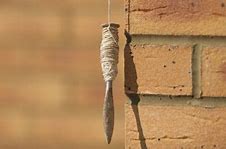God’s Plumb Line: text of a sermon preached by Sister Hannah C.S.M. in All Saints’ Church, Franklin, North Carolina on Sunday 15th July
Proper 10B. For the Old Testament: Amos 7:7-15

Growing up in North Carolina, I’ve been accustomed to such phrases as “being plumb tired” or “plumb crazy” (in case you were wondering, that’s not a good thing!) or, if someone was good at their job, they would be doing “plumb job.” But, to be honest, I had to check with my former Old Testament professor Rebecca Wright about the origins of a “plumb line” that we heard about from the first lesson from Amos this morning. Not a phrase I grew up with! She said that “a plumb line is a weight tied to the end of a string – a simple piece of technology that anyone can use. It makes immediate visual sense if you hold a plumb line against a wall. Everyone can see whether or not the wall is straight or ‘plumb’ – another name for straight.” She thinks this powerful metaphor was used in this Amos passage to say, “the judgment on Israel will be that obvious, that non-ambiguous” as when you use a plumb line. [1]
Just to bring us up to speed with what’s going on in this Amos passage: King Jeroboam’s sin was idolatry. Even Amaziah the priest admitted that the temple was the king’s sanctuary rather than the sanctuary of God. Its function was supposed to be a location where people came to worship God but instead it was all about King Jeroboam – his power, his praise and his prestige. And Amos says it’s judgment time against this king. It can be easy for us to think of God as being cruel when God enacts judgment but perhaps sometimes judgment is needed to prevent further harm. God knows that living a life solely focused on yourself isn’t really living, and perhaps this judgment was to halt the rippling effects the kingdom was facing from having a self-centred ruler. We must remember that with God’s judgement there is always grace in it as well.
But, all of this being a good lesson about the evils of selfishness and self-destruction, what about us? Where do we, the hearers, fit in?
One of the tools we use each day at the convent is the practice of Lectio Divina. That phrase translates into “Divine Reading.” It involves a prayerful reading of a passage of scripture. Although this is an ancient Benedictine Christian practice that we use since we are a Benedictine Order, it originates from the reverence the Jewish people of faith have towards scripture. The first step is just to listen to a passage of scripture as it is read out loud. One of the guiding Benedictine values is to listen: as in the Rule of St Benedict, where Benedict tells his monks to “listen with the ear of their heart” to God in every moment of life. I have to confess my love for the original James Bond movies. I think of Q, the techy guy who gave Bond all the cool gadgets, and I remember distinctly how he would begin each lecture on the new devices with the exactly same phrase to Bond, “Now, PAY ATTENTION!” Because of course Bond would get distracted! And so do we when it comes to focusing on God, focusing on scripture, and focusing on prayer.
After the passage has been read once out loud, then you try to identify a specific phrase or word that speaks to you and meditate on it. For me in this passage the phrase was “plumb line”, so I sat with that for a few minutes. The third step in Lectio is to pray. You talk to God about that word you’ve been thinking about. And the final step is contemplation – a word that can sound intimidating – but means simply to be still in the presence of God without words. It’s as if you are sitting with someone you are really close to – whether spouse, family member, or close friend – and you know each other so well that words aren’t necessary. It’s like that, but it’s with God.[2] This process of Lectio can be done by yourself or in a group Bible study or in a retreat and can be beneficial for wrestling through difficult passages as a group to see what God is saying to each person.
Now, let’s pay attention! Back to Amos! I kept thinking about that plumb line and remembering that its purpose was to see how other things  line up and measure up to it. And I thought about what measurements society uses to determine our worth – in other words, what are people trying to measure up to in the world? I’m sure you can guess them. Money, wealth, status – career, job, success – how happy your marriage, family, and kids are – your looks, weight, health – basically, just look at the cover of any popular magazine to see what things they have to measure your worth.
line up and measure up to it. And I thought about what measurements society uses to determine our worth – in other words, what are people trying to measure up to in the world? I’m sure you can guess them. Money, wealth, status – career, job, success – how happy your marriage, family, and kids are – your looks, weight, health – basically, just look at the cover of any popular magazine to see what things they have to measure your worth.
But what happens if your relationships aren’t perfect? What if you just lost your job? Or got bad news from the doctor? What if those measurements of your worth and value stop hanging down like a line and instead are clinging tightly around you, those lines wrapped like cords around and around us until we feel that we can’t breathe? What then?
So first, you DO breathe! I had a priest I knew that started all of her sermons with three deep breaths. It’s not a bad thing to remember to do when we feel stressed! And I think as Christians, when we feel wound up in the plumb lines of society, it’s important to remember the only plumb line that matters – how we measure up to God. You see those other lines are all self-focused, but when we strive to follow God and what God wants, we become other-focused—focused on striving to do God’s will and serve others.
But what happens when we forget our purpose and can’t remember what God wants of us? Well, if you will turn with me to page 292 in the Book of Common Prayer we can all be reminded of what we promised God we would strive to “line up to” when we were baptized. Most people, when they think of vows, think of marriage vows or religious vows, but all baptized Christians made baptismal vows that we renew each Easter. So let us look together at what we vowed to God we would do.
· Renounce evil
· Believe in the Trinity
· Continue the fellowship of the church
· Resist evil; and not IF but WHEN we fall short, repent – we won’t let those mistakes hang onto us
· Proclaim by word and example the Good News
· Seek and serve Christ in ALL persons
· Strive for justice and peace among ALL people and respect the dignity of every human being
And let’s not forget that each response is not “Yes Lord, I will do it, I am going to reach it, I can achieve it!” but rather “I will, with God’s help” – it’s a humble statement, knowing we NEED God for any of this to happen. In our daily prayer as we seek to listen to God in ourselves, in creation, in others, and in all aspects of life, we can say, “Lord, I want to follow you, help me see you, I need your help,” and lean not on our own understanding.
Perhaps God wants us to stop living just for ourselves because God has something bigger and better planned for our lives that goes beyond ourselves? Perhaps we can’t even imagine what can happen once we give the brokenness of ourselves and our lives to God? Perhaps those shattered pieces, once illuminated with the light of God’s grace, will form a kaleidoscope of beauty that reflects the image of God in us?
May our lives echo the words of the prophets as we become that voice in the wilderness that aligns our whole selves to make straight the paths of our lives for God, so that the purposes of God may be fulfilled in our lives and light the paths of others. AMEN.
[1] Email correspondence with the Reverend Dr Rebecca Abts Wright on 7th July 2018.
[2] Fr. Luke Dysinger O.S.B., “Accepting the Embrace of God: The Ancient Art of Lectio Divina”: online at http://www.saintjohnsabbey.org/monastic-life/abbey-spirituality1/lectio-divina/accepting-embrace-god-ancient-art-lectio-divina/

